8 books about His World
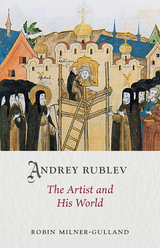
Andrey Rublev
The Artist and His World
Robin Milner-Gulland
Reaktion Books, 2023
A critical biography of the most celebrated religious icon painter in medieval Russia.
A monk from Moscow, Andrey Rublev (c.1360–c.1430) is heralded as the greatest painter of religious icons and frescos in medieval Russia. Nevertheless, his life remains largely mysterious to historians and devotees alike. In this book, Robin Milner-Gulland provides the first English-language account of the artist’s life as a window into the world of medieval Moscow. Beautifully illustrated with previously unpublished images, Andrey Rublev offers an accessible introduction to the artist’s medieval world and his continuing significance today.
A monk from Moscow, Andrey Rublev (c.1360–c.1430) is heralded as the greatest painter of religious icons and frescos in medieval Russia. Nevertheless, his life remains largely mysterious to historians and devotees alike. In this book, Robin Milner-Gulland provides the first English-language account of the artist’s life as a window into the world of medieval Moscow. Beautifully illustrated with previously unpublished images, Andrey Rublev offers an accessible introduction to the artist’s medieval world and his continuing significance today.
[more]

Berlioz and His World
Edited by Francesca Brittan and Sarah Hibberd
University of Chicago Press, 2024
A collection of essays and short object lessons on the composer Hector Berlioz, published in collaboration with the Bard Music Festival.
Hector Berlioz (1803–1869) has long been a difficult figure to place and interpret. Famously, in Richard Wagner’s estimation, he hovered as a “transient, marvelous exception,” a composer woefully and willfully isolated. In the assessment of German composer Ferdinand Hiller, he was a fleeting comet who “does not belong in our musical solar system,” the likes of whom would never be seen again. For his contemporaries, as for later critics, Berlioz was simply too strange—and too noisy, too loud, too German, too literary, too cavalier with genre and form, and too difficult to analyze. He was, in many ways, a composer without a world.
Berlioz and His World takes a deep dive into the composer’s complex legacy, tracing lines between his musical and literary output and the scientific, sociological, technological, and political influences that shaped him. Comprising nine essays covering key facets of Berlioz’s contribution and six short “object lessons” meant as conversation starters, the book reveals Berlioz as a richly intersectional figure. His very difficulty, his tendency to straddle the worlds of composer, conductor, and critic, is revealed as a strength, inviting new lines of cross-disciplinary inquiry and a fresh look at his European and American reception.
Hector Berlioz (1803–1869) has long been a difficult figure to place and interpret. Famously, in Richard Wagner’s estimation, he hovered as a “transient, marvelous exception,” a composer woefully and willfully isolated. In the assessment of German composer Ferdinand Hiller, he was a fleeting comet who “does not belong in our musical solar system,” the likes of whom would never be seen again. For his contemporaries, as for later critics, Berlioz was simply too strange—and too noisy, too loud, too German, too literary, too cavalier with genre and form, and too difficult to analyze. He was, in many ways, a composer without a world.
Berlioz and His World takes a deep dive into the composer’s complex legacy, tracing lines between his musical and literary output and the scientific, sociological, technological, and political influences that shaped him. Comprising nine essays covering key facets of Berlioz’s contribution and six short “object lessons” meant as conversation starters, the book reveals Berlioz as a richly intersectional figure. His very difficulty, his tendency to straddle the worlds of composer, conductor, and critic, is revealed as a strength, inviting new lines of cross-disciplinary inquiry and a fresh look at his European and American reception.
[more]
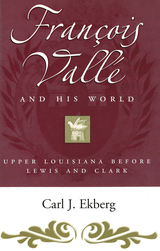
Francois Vallé and His World
Upper Louisiana before Lewis and Clark
Carl J. Ekberg
University of Missouri Press, 2002
Winner of the Kemper & Leila Williams Prize in Louisiana History for excellence in historical scholarship for the year 2002, awarded by The Historic New Orleans Collection, The Louisiana Historical Association.
In François Vallé and His World, Carl Ekberg provides a fascinating biography of François Vallé (1716–1783), placing him within the context of his place and time. Vallé, who was born in Beauport, Canada, immigrated to Upper Louisiana (the Illinois Country) as a penniless common laborer sometime during the early 1740s. Engaged in agriculture, lead mining, and the Indian trade, he ultimately became the wealthiest and most powerful individual in Upper Louisiana, although he never learned to read or write.
Ekberg focuses on Upper Louisiana in colonial times, long before Lewis and Clark arrived in the Mississippi River valley and before American sovereignty had reached the eastern bank of the Mississippi. He vividly captures the ambience of life in the eighteenth-century frontier agricultural society that Vallé inhabited, shedding new light on the French and Spanish colonial regimes in Louisiana and on the Mississippi River frontier before the Americans arrived.
Based entirely on primary source documents—wills and testaments, parish registers of baptisms, marriages, and burials, and Spanish administrative correspondence—found in archives ranging from St. Louis and Ste. Genevieve to New Orleans and Seville, François Vallé and His World traces not only the life of François Vallé and the lives of his immediate family members, but also the lives of his slaves. In doing so, it provides a portrait of Missouri’s very first black families, something that has never before been attempted. Ekberg also analyzes how the illiterate Vallé became the richest person in all of Upper Louisiana, and how he rose in the sociopolitical hierarchy to become an important servant of the Spanish monarchy.
François Vallé and His World provides a useful corrective to the fallacious notion that Missouri’s history began with the arrival of Lewis and Clark at the turn of the nineteenth century. Anyone with an interest in colonial history or the history of the Mississippi River valley will find this book of great value.
[more]

A Historian and His World
A Life of Christopher Dawson, 1889-1970
Christina Scott
Catholic University of America Press, 2023
The English historian of culture Christopher Dawson (1889-1970) was an independent scholar and the author of more than twenty books. He served as assistant lecturer in the History of Culture, University College, Exeter (1925), Forwood Lecturer in the Philosophy of Religion, University of Liverpool (1934), Gifford Lecturer at the University of Edinburgh (1947-1949), and as Professor of Catholic Studies at Harvard University (1958-1962). He was elected Fellow of the British Academy in 1943 and edited the Dublin Review during the Second World War. This biography by Christina Scott, Dawson’s daughter, is a sensitive portrait of a complex and fascinating scholar.
Unlike other English Christian converts of the twentieth century who excelled in literature, like G. K. Chesterton or C. S. Lewis, Dawson turned to the social sciences. He drew from the new idea of culture as a common way of life emerging from anthropology at the time of the Great War to shape a new approach to history. His study of the intimate relationship between religion and culture throughout world history shaped his trenchant criticisms of his own times. He wrote in 1955 that, “the first step in the transformation of culture is a change in the pattern of culture within the mind, for this is the seed out of which there spring new forms of life which ultimately change the social way of life and thus create a new culture.” Dawson’s engagement with anthropology and the idea of culture marked an important moment of development in the Catholic intellectual tradition.
Christina Scott shows that Dawson is best understood as he himself interpreted his historical subjects—in the context of “the spiritual world in which he lived, the ideas that moved him, and the faith that inspired his action.” Dawson was not a historian of ideas for their own sake; he had a passionate belief in their liberating power. A Historian and His World will be of interest to intellectual historians, historians of religion and culture, and students of modern Catholic thought. The Introduction is written by Dawson scholar Joseph T. Stuart and the book is graced by a postscript by Christopher Dawson reflecting upon the meaning of his work.
[more]
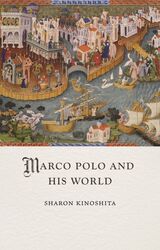
Marco Polo and His World
Sharon Kinoshita
Reaktion Books, 2024
A lavishly illustrated tour of the famed adventurer’s globetrotting travels, written by a celebrated translator of Polo’s writings.
At the age of seventeen, Marco Polo left his Venetian home on a continent-spanning adventure that lasted for nearly a quarter century. Imprisoned in Genoa five years later, he collaborated with Arthurian romance writer Rustichello of Pisa on a work they called The Description of the World. That book recounted “all the greatest marvels and great diversities of Greater Armenia, Persia, the Tartars, India, and many other provinces,” a story that made Polo famous for all time.
In Marco Polo and His World, Sharon Kinoshita brings these marvels to life, describing the myriad commodities, plants, people, and animals that Marco encountered and recorded. Copiously illustrated, this book offers a vibrant introduction to Marco Polo’s astounding adventures.
At the age of seventeen, Marco Polo left his Venetian home on a continent-spanning adventure that lasted for nearly a quarter century. Imprisoned in Genoa five years later, he collaborated with Arthurian romance writer Rustichello of Pisa on a work they called The Description of the World. That book recounted “all the greatest marvels and great diversities of Greater Armenia, Persia, the Tartars, India, and many other provinces,” a story that made Polo famous for all time.
In Marco Polo and His World, Sharon Kinoshita brings these marvels to life, describing the myriad commodities, plants, people, and animals that Marco encountered and recorded. Copiously illustrated, this book offers a vibrant introduction to Marco Polo’s astounding adventures.
[more]
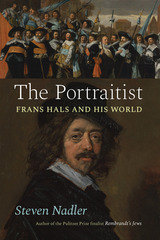
The Portraitist
Frans Hals and His World
Steven Nadler
University of Chicago Press, 2022
A biography of the great portraitist Frans Hals that takes the reader into the turbulent world of the Dutch Golden Age.
Frans Hals was one of the greatest portrait painters in history, and his style transformed ideas and expectations about what portraiture can do and what a painting should look like.
Hals was a member of the great trifecta of Dutch Baroque painters alongside Rembrandt and Vermeer, and he was the portraitist of choice for entrepreneurs, merchants, professionals, theologians, intellectuals, militiamen, and even his fellow artists in the Dutch Golden Age. His works, with their visible brush strokes and bold execution, lacked the fine detail and smooth finish common among his peers, and some dismissed his works as sloppy and unfinished. But for others, they were fresh and exciting, filled with a sense of the sitter’s animated presence captured with energy and immediacy.
Steven Nadler gives us the first full-length biography of Hals in many years and offers a view into seventeenth-century Haarlem and this culturally rich era of the Dutch Republic. He tells the story not only of Hals’s life, but also of the artistic, social, political, and religious worlds in which he lived and worked.
Frans Hals was one of the greatest portrait painters in history, and his style transformed ideas and expectations about what portraiture can do and what a painting should look like.
Hals was a member of the great trifecta of Dutch Baroque painters alongside Rembrandt and Vermeer, and he was the portraitist of choice for entrepreneurs, merchants, professionals, theologians, intellectuals, militiamen, and even his fellow artists in the Dutch Golden Age. His works, with their visible brush strokes and bold execution, lacked the fine detail and smooth finish common among his peers, and some dismissed his works as sloppy and unfinished. But for others, they were fresh and exciting, filled with a sense of the sitter’s animated presence captured with energy and immediacy.
Steven Nadler gives us the first full-length biography of Hals in many years and offers a view into seventeenth-century Haarlem and this culturally rich era of the Dutch Republic. He tells the story not only of Hals’s life, but also of the artistic, social, political, and religious worlds in which he lived and worked.
[more]
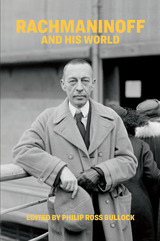
Rachmaninoff and His World
Edited by Philip Ross Bullock
University of Chicago Press, 2022
A biography of composer Sergei Rachmaninoff, published in collaboration with the Bard Music Festival.
One of the most popular classical composers of all time, Sergei Rachmaninoff (1873–1943) has often been dismissed by critics as a conservative, nostalgic holdover of the nineteenth century and a composer fundamentally hostile to musical modernism. The original essays collected here show how he was more responsive to aspects of contemporary musical life than is often thought, and how his deeply felt sense of Russianness coexisted with an appreciation of American and European culture. In particular, the essays document his involvement with intellectual and artistic circles in prerevolutionary Moscow and how the form of modernity they promoted shaped his early output. This volume represents one of the first serious explorations of Rachmaninoff’s successful career as a composer, pianist, and conductor, first in late Imperial Russia, and then after emigration in both the United States and interwar Europe. Shedding light on some unfamiliar works, especially his three operas and his many songs, the book also includes a substantial number of new documents illustrating Rachmaninoff’s celebrity status in America.
One of the most popular classical composers of all time, Sergei Rachmaninoff (1873–1943) has often been dismissed by critics as a conservative, nostalgic holdover of the nineteenth century and a composer fundamentally hostile to musical modernism. The original essays collected here show how he was more responsive to aspects of contemporary musical life than is often thought, and how his deeply felt sense of Russianness coexisted with an appreciation of American and European culture. In particular, the essays document his involvement with intellectual and artistic circles in prerevolutionary Moscow and how the form of modernity they promoted shaped his early output. This volume represents one of the first serious explorations of Rachmaninoff’s successful career as a composer, pianist, and conductor, first in late Imperial Russia, and then after emigration in both the United States and interwar Europe. Shedding light on some unfamiliar works, especially his three operas and his many songs, the book also includes a substantial number of new documents illustrating Rachmaninoff’s celebrity status in America.
[more]
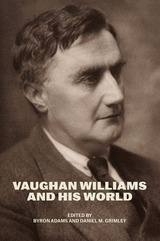
Vaughan Williams and His World
Edited by Byron Adams and Daniel M. Grimley
University of Chicago Press, 2023
A biography of Ralph Vaughan Williams, published in collaboration with the Bard Music Festival.
Ralph Vaughan Williams (1872–1958) was one of the most innovative and creative figures in twentieth-century music, whose symphonies stand alongside those of Sibelius, Nielsen, Shostakovich, and Roussel. After his death, shifting priorities in the music world led to a period of critical neglect. What could not have been foreseen is that by the second decade of the twenty-first century, a handful of Vaughan Williams’s scores would attain immense popularity worldwide. Yet the present renown of these pieces has led to misapprehension about the nature of Vaughan Williams’s cultural nationalism and a distorted view of his international cultural and musical significance.
Vaughan Williams and His World traces the composer’s stylistic and aesthetic development in a broadly chronological fashion, reappraising Vaughan Williams’s music composed during and after the Second World War and affirming his status as an artist whose leftist political convictions pervaded his life and music. This volume reclaims Vaughan Williams’s deeply held progressive ethical and democratic convictions while celebrating his achievements as a composer.
Ralph Vaughan Williams (1872–1958) was one of the most innovative and creative figures in twentieth-century music, whose symphonies stand alongside those of Sibelius, Nielsen, Shostakovich, and Roussel. After his death, shifting priorities in the music world led to a period of critical neglect. What could not have been foreseen is that by the second decade of the twenty-first century, a handful of Vaughan Williams’s scores would attain immense popularity worldwide. Yet the present renown of these pieces has led to misapprehension about the nature of Vaughan Williams’s cultural nationalism and a distorted view of his international cultural and musical significance.
Vaughan Williams and His World traces the composer’s stylistic and aesthetic development in a broadly chronological fashion, reappraising Vaughan Williams’s music composed during and after the Second World War and affirming his status as an artist whose leftist political convictions pervaded his life and music. This volume reclaims Vaughan Williams’s deeply held progressive ethical and democratic convictions while celebrating his achievements as a composer.
[more]
READERS
Browse our collection.
PUBLISHERS
See BiblioVault's publisher services.
STUDENT SERVICES
Files for college accessibility offices.
UChicago Accessibility Resources
home | accessibility | search | about | contact us
BiblioVault ® 2001 - 2024
The University of Chicago Press









